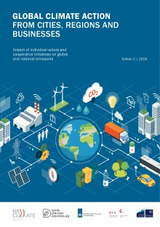Books

Global climate action from cities, regions and businesses: impact of individual actors and cooperative initiatives on global and national emissions
Kuramochi, Takeshi / Swithin Lui / Niklas Höhne / […]/ Sander Chan et. al.Books (2019)
Cologne: New Climate Institute (Edition 2/2019)
Cities, regions, and business are vital for achieving national and global climate change goals. Their climate action helps countries deliver and in some cases over-achieve current national pledges under the Paris Agreement. Globally, existing initiatives by these actors, in partnership with national governments, could put the world on track to limit global warming to 2°C, if they deliver their stated goals. While not yet sufficient to stay below the 1.5°C limit, climate action by cities, regions, and business allows national governments to raise their commitments and helps keep global limits within reach.
The Intergovernmental Panel on Climate Change (IPCC) 2018 special report on warming of 1.5 °C (SR1.5) emphasised the need for all actors — state, sub-national, and non-state — to strengthen climate action, and highlighted cooperation between actors as a critical mechanism for halving emissions by 2030 in order to meet the 1.5°C goal. In addition to helping achieve the goals of the Paris Agreement, climate action by cities, regions and business can support the delivery of other Sustainable Development Goals (SDGs) by 2030. Given the increasing attention to synergies and potentially negative impacts between climate action and other SDGs, cities, regions and business can help ensure that global climate efforts are implemented in a way that supports, rather than hinders, local sustainable development.
This report is the second global analysis of local and regional government and corporate climate contributions, updating “Global Climate Action from Cities, Regions, and Companies” launched at the 2018 Global Climate Action Summit. The 2018 report established the strong potential of subnational and non-state actors to help avoid climate change. This year, we aim to inform the September 2019 UN Climate Action Summit on how mitigation by cities, regions and companies could help national governments boost their ambition beyond their current targets, to come in line with the Paris Agreement’s goals. This report aggregates the climate mitigation commitments reported to some of the world’s largest voluntary pledging and reporting platforms for city, region, and company climate commitments.
The analysis was conducted at a global level as well as for ten major emitting economies: Brazil, Canada, China, the European Union (EU), India, Indonesia, Japan, Mexico, South Africa and the United States (US). In addition, the report features the following new components: An updated assessment of international cooperative initiatives (ICIs) and whether their outputs are consistent with their main functions; An updated assessment of synergies and trade-offs between non-state international initiatives and SDGs.
Contact
Cornelia Hornschild
Publication Coordinator
E-mail Cornelia.Hornschild@idos-research.de
Phone +49 (0)228 94927-135
Fax +49 (0)228 94927-130
Alexandra Fante
Librarian/ Open Access Coordinator
E-Mail Alexandra.Fante@idos-research.de
Telefon +49 (0)228 94927-321
Fax +49 (0)228 94927-130



![[Translate to English:] Photo: Alexandra Fante, Bibliothekarin/Open Access-Koordinatorin](/fileadmin/_processed_/f/0/csm__c_Deutsches-Institut-fuer-Entwicklungspolitik_Fante_94ce4fa1ba.jpg)